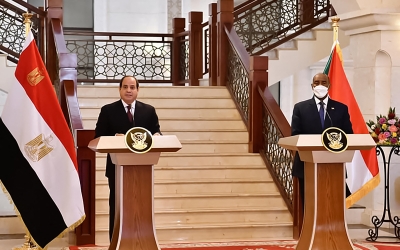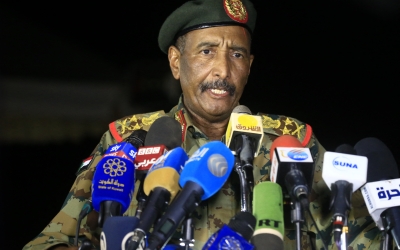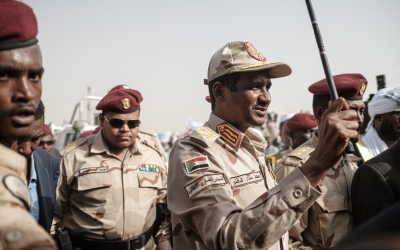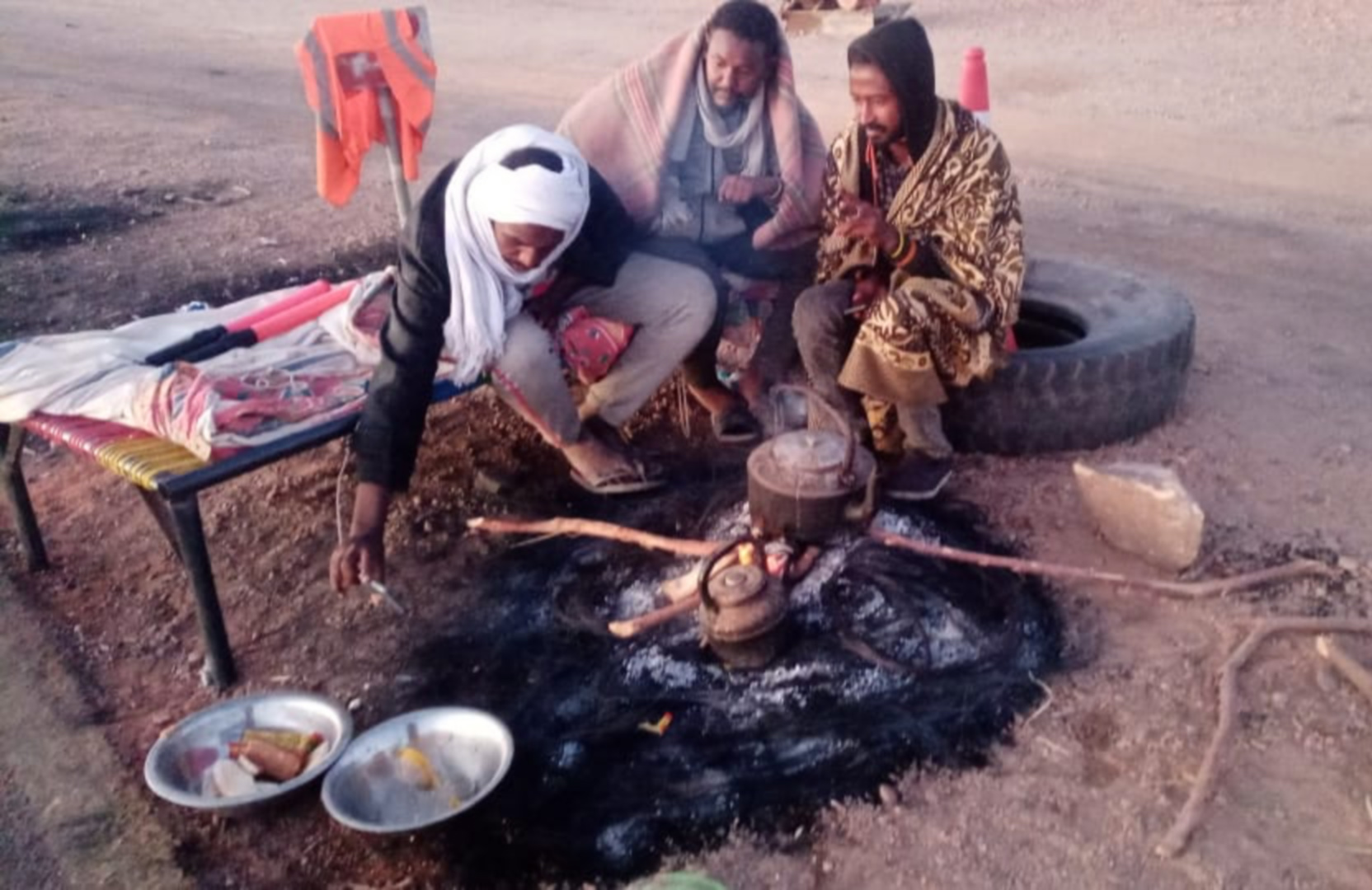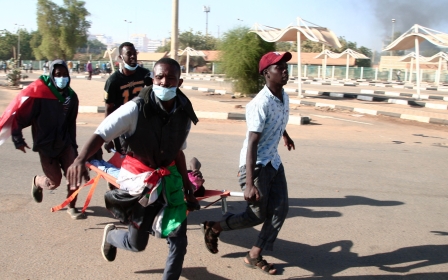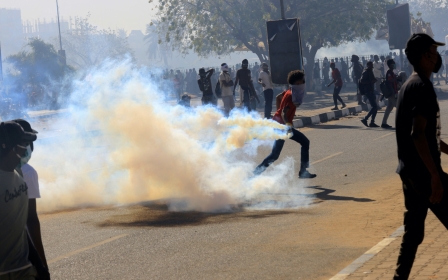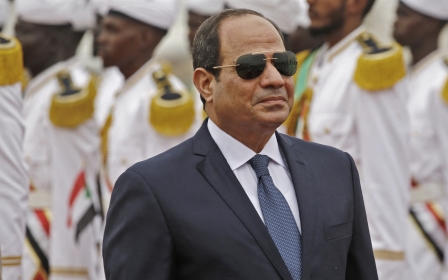Sudan protesters barricade Egypt border roads as face off with military continues
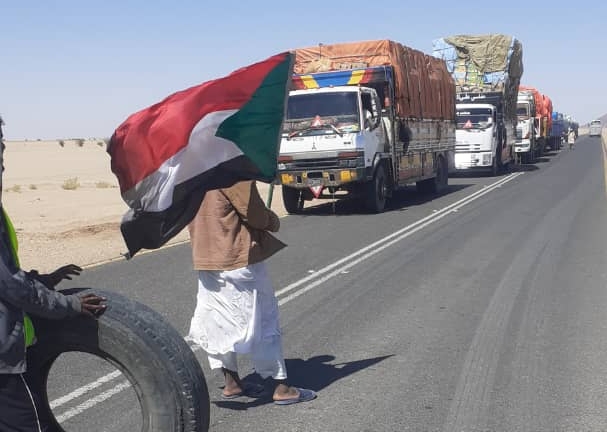
Atif Abdul-Faraj woke up early on Wednesday 9 February in his village of Sortod, in Sudan's Northern state. Gathering his things together, he prepared to join protesters blocking a major export route linking Sudan with Egypt.
Like hundreds of Sudanese fighting against last October's military coup, Abdul-Faraj had since late January been setting up barricades at Hafir Masho, near the Northern state capital of Dongola, and other border areas, to stop trucks exporting livestock driving into Egypt.
New MEE newsletter: Jerusalem Dispatch
Sign up to get the latest insights and analysis on Israel-Palestine, alongside Turkey Unpacked and other MEE newsletters
But as tensions between truck drivers and protesters continued to rise, Abdul-Faraj never reached his destination that Wednesday morning.
The 34-year-old was killed when a truck tried to break up a barricade, veering off the road and crashing into him. The young protester died before reaching the hospital.
Protesters are demanding that a sharp rise in electricity prices for farmers be scrapped, an issue that has flared anti-military sentiments and led to the current tensions in the north.
Egypt is also being targeted for the support the protesters say President Abdel Fattah el-Sisi's government is giving to military coup leaders in Khartoum.
A friend of Abdul-Faraj, who asked for his name not to be used over safety concerns, accused the driver - who is thought to be Egyptian - of intentionally driving into the victim, adding that the authorities have not arrested the driver, after he fled the scene.
“We believe that the authorities are siding with the Egyptian because they are implementing the orders of the generals in Khartoum who want to create this state of insecurity to scare us,” he told Middle East Eye.
Barricades of the North
Incidents like this have raised tensions not just near the Sudanese-Egyptian border, but also along the road linking the capital Khartoum with Egypt through the states of River Nile and Northern.
But the anger of the people who have blocked the flow of exports to Egypt and stopped hundreds of Egyptian trucks at different crossing points has not waned.
Calling themselves Barricades of the North, the border protesters have vowed to continue their sit-in until they bring down the leaders of the coup and “punish” the Egyptian government for supporting it.
Wael el-Imam, a resistance committee spokesman in Northern state, said that the tension has quickly turned into direct confrontations between protesters and the Egyptian drivers, which has led to injuries among some protesters in Abri, Sortod, al-Borgeig and other areas.
The Barricades of the North movement has extended its presence and activities across northern Sudan, including al-Dabbah, Merowe, al-Hamadab, al-Multaga, Gabriya, Hafir Masho and al-Borgeig.
Most recently, Imam told MEE, the movement has taken to Abri, which is located near to the last crossing point at the border.
“The crossing points have been witnessing cat and mouse confrontations between protesters and the police as they attempt to remove the barricades,” he said.
“Police forces have used violence, including tear gas, in Hafir Masho.”
Meanwhile, another escalation occurred in al-Hamadab, when unknown armed groups joined the crackdown on protesters manning the barricade a few days ago, according to Imam and other protesters.
“Armed groups attacked us at our barricade on 8 February and broke up the barricade and the sit-in that was about to be staged in the area,” Abdul-Gadir Ali, a protester from a village near al-Hamadab, told MEE.
“We believe that the groups that attacked the protesters are close to the militias of the former regime who broke up the sit-in in front of the army headquarters in June 2019, since they have been active since the military coup,” claimed Ali, in reference to the violent crackdown on demonstrators that led to the massacre of at least 100 people.
Joint security forces
On 13 February, security forces attacked hundreds of protesters in Hafir Masho, dispersing the sit-in, destroying tents and arresting dozens of people. The protesters were later freed.
“The barricade in Hafir Masho began on 19 January, and due to the large number of protesters, the blockade quickly turned into a wide sit-in with thousands of people joining,” Abdullah Abdul-Moniem, a resistance committee protester, told MEE.
“We stopped more than 200 trucks carrying different kinds of agricultural commodities and livestock, including 41 trucks belonging to the RSF carrying thousands of camels,” Moniem said.
He said that the protesters at the barricade have captured trucks belonging to the Rapid Support Forces (RSF) militia, which were carrying thousands of camels and cattle to Egypt, adding that this is probably the reason behind the crackdown on the sit-in.
Moniem said that a large contingent of combined forces from the police, security, army and RSF have participated in the attack on the sit-in.
“We repulsed many attempts by the authorities, unknown Sudanese armed groups and even the Egyptian truck drivers to break up the barricade, but the attack on 13 February was the largest because of the combined forces,” he said.
Preparations to erect new barricades in Hafir Masho and al-Hamadab are underway, according to protesters.
MEE contacted the local police in the state for comment, but received no answer.
‘We are innocent’
After the attacks on the Hafir Masho and al-Hamadab barricades, resistance committees installed a large road block in Abri, around a two-hour drive from Hafir Masho, on what is known as al-Tahadi road (Challenge road, in English).
Hundreds of protesters placed high barricades of sand, large machines and containers to block the roads.
'We are fighting against the Sudanese police and security organs, pro-government militias and Egyptian drivers'
- Hamza Mohammed al-Tahir, Barricades of the North
They have also burned tires, as dozens of Egyptian trucks full of agricultural merchandise and livestock stood idly by on the road.
Hamza Mohammed al-Tahir, a leading member in the Barricades of the North movement, told MEE that Abri protesters have closed the road near the border with Egypt after the police and pro-government militias broke up the barricades in Hafir Masho and other areas.
“We are fighting against the Sudanese police and security organs, pro-government militias and Egyptian drivers. Dozens of our comrades were wounded in confrontation with the Egyptians or in police violence, but we will continue fighting,” Tahir said.
“We have the right to defend our resources from being smuggled to Egypt by our military coup generals that collaborate with the Egyptian military regime.”
More than 400 Egyptian trucks are currently stuck at the barricades of al-Borgeig and Abri, according to Tahir, who added that they will not let them through.
Meanwhile, Egyptian driver Mohammed Abdul-Alaim told MEE that the drivers are blameless and have nothing to do with the politics that led to the current situation, calling on protesters to help them carry out their jobs.
“We are innocent... We have no problems with the protesters or with the citizens of the Northern state or with the Sudanese people in general,” he said.
“They are our brothers and we want the two nations to benefit from this trade.”
Government promises
For its part, the Sudanese government has promised to solve the problems of the farmers in Northern state, including the increase of the electricity tariff, the issue that ignited protests.
After a meeting between the farmers union and the Sudanese Sovereign Council headed by coup leader General Abdul Fattah al-Burhan, the council declared that the electricity tariff would be frozen until the coming agriculture cultivation season.
However, the resistance committees in Northern state said that the farmers union is not recognising the people of the state.
The committees have rejected the increase in electricity prices, and are also standing against the military coup, and the domination of Sudanese resources by Egyptian importers, according to the leaders of Barricades of the North.
The coup ended a power-sharing agreement between the military and civilians, putting an end to a fragile transition process following the ousting of longtime ruler Omar al-Bashir, and dissolving a government that had made boosting agriculture a key pillar of its economic programme.
Middle East Eye delivers independent and unrivalled coverage and analysis of the Middle East, North Africa and beyond. To learn more about republishing this content and the associated fees, please fill out this form. More about MEE can be found here.


